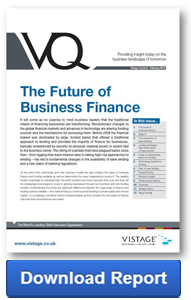.jpg)
In 2013 the hard truth is that over 50% of all SMEs that applied for bank loans or overdraft facilities were refused any lending. What's more shocking is that they when they were denied- they did not know where else to look? According to research 80% of business leaders who were rejected said that they were not given any information about alternative routes to finance.
Here is a list of 10 for your consideration.
Short-term sources of finance
1. Family and friends
In a 2012 Experian survey, 20% of businesses said that they relied on money from family or friends. The main issue with using this source is that the decision and the responsibility are not just financial. The pressure is often greater as it is combined with the fear that a failed business can often destroy a family or a friendship overnight. The most important thing to do is to treat the arrangement as you would with any other business transaction; make sure that you formalise everything.
Some tips
- For a short term loan-
You could document this as a loan agreement with clear rules relating to interest due and what happens if a loan is not repaid on time - For a long term agreement-
An investment in shares is probably appropriate. Make sure that you have a shareholders agreement as this will reduce the risk of any further disputes further down the line
2. Invoice financiers and factoring
Invoice finance can free the money that you have tied up in unpaid invoices.
Factoring also allows you to sell your debt to another company. The factoring company pays you immediately and gets the money from your customer when it's due- please note that they will charge you a percentage fee.
It is important to understand the main variables that determine the funding you can access
- Overall facility limit- the funder will set a facility limit as a review mechanism, normally building in enough headroom to enable growth
- Prepayment level- this is the % of the gross turnover that a funder will advance against the invoice, normally 60%-90%
- Concentration levels- this is good practice for long term sustainability and provides confidence to funders when they see a good debtor spread
- Charges- each provider will structure this facility differently but it will be dependent on sector, size of business, service levels, and debtor quality amongst other things
3. Cash advances
There are a few different ways that you can access cash that is held up in your business including auctioning invoices for larger customers and grabbing advance access to cash tied up in credit card payments.
4. Trade credit
This is every businesses best friend- if your period of financial difficulty is temporary you may often be able to request an extension in your payment terms with certain suppliers. This will give you a chance to pay for your goods after you have made the sales. However this will only be possible if you have a strong relationship with them and a history of prompt payment certainly helps.
Mid- to long-term sources of finance
5. Lease finance
This is often used when businesses require new machinery and simply cannot pay the amount in one lump sum. The lender will continue to own the asset but your business will benefit from using it at a reduced rate. Sometimes you are able to retain the asset at the end of the lease period for an agreed amount of money.
6. Community Development Finance Initiatives (CDFIs)
CDFIs are non-profit organisations that will lend money to individuals, businesses, social enterprises and charities who can use the money to help and develop their local community.
There are many CDFIs available in the UK, providing financial support to business with up to 249 employees that may find it difficult to access funding from regular commercial banks.
7. Grants
There are still some great government grants available to business, for specific purposes or projects. There is real encouragement from the government for innovation and research development so there are often opportunities for businesses to apply for a research development grant.
8. Other government finance schemes
In this year's budget the government announced a series of schemes available to business leaders, such as:
- Start Up Loan Scheme
- Enterprise Finance Guarantee (EFG) scheme
- Trade credit insurance
- Government's Enterprise Capital Funds programme
- Business Angel Co Investment Fund
- UK export finance
- GrowthAccelerator
- Growth Voucher Scheme
9. Crowdfunding
You could join millions of other busines leaders that have succesfully used crowdfunding to get acess to finance that may not have been available to secure through other sources. This alternative type of angel investment involves a number of investors (including the government) and gives the opporunity to invest smaller pockets of money into a business. These pockets are then then pooled together in order to help a business reach its funding target.
10. Angel Investors
An angel investor is someone who invests their own money in to a small business, often in exchange for shares. Their financial involvement is normally coupled with business advice as an "Angel" they are personally interested in their investment becoming a success. This is a great way to receive funding for start ups and businesses focused on accelerated growth.
Our gift to you...
Apply now for your personal leadership consultation with a Vistage Chair. They'll help you assess areas of strength of your business and identify areas of potential growth.


